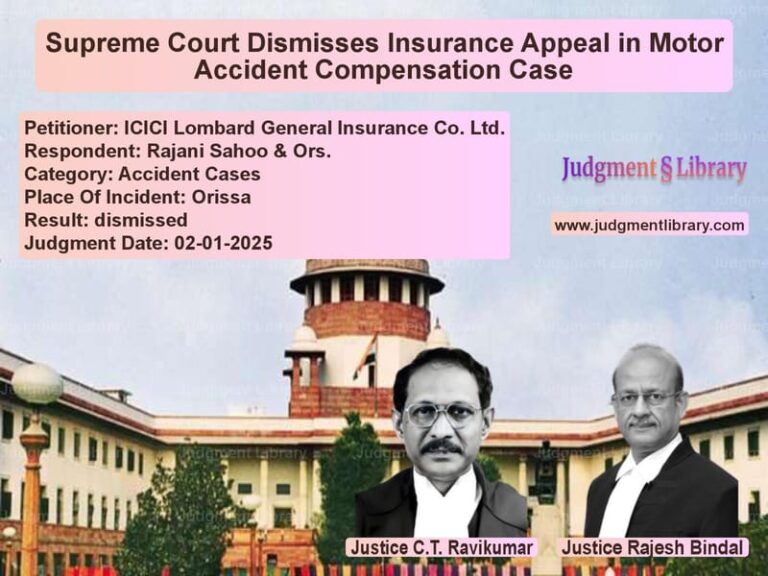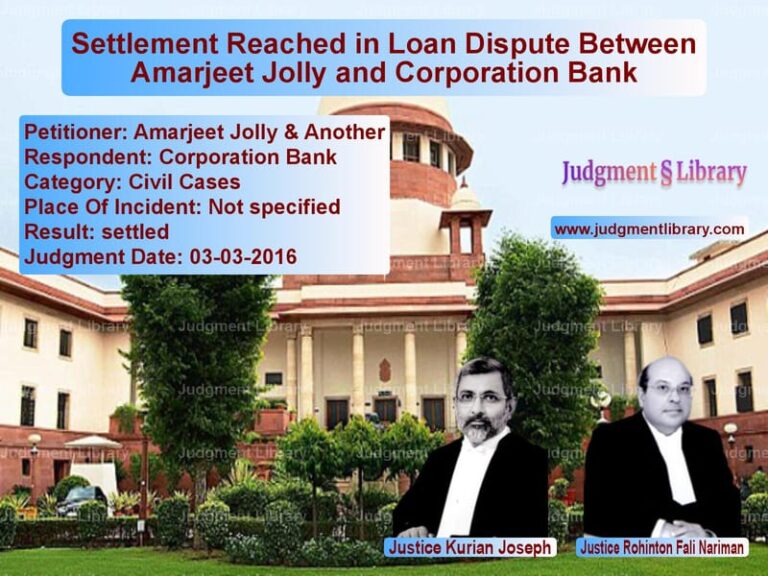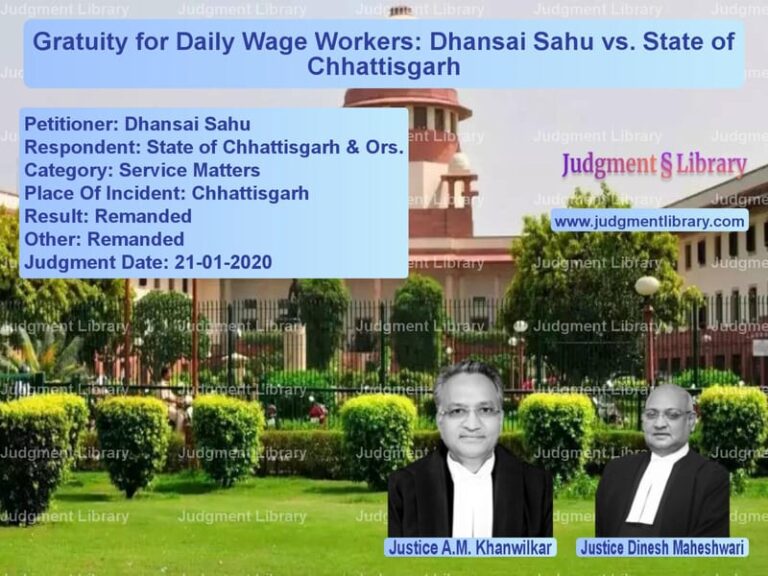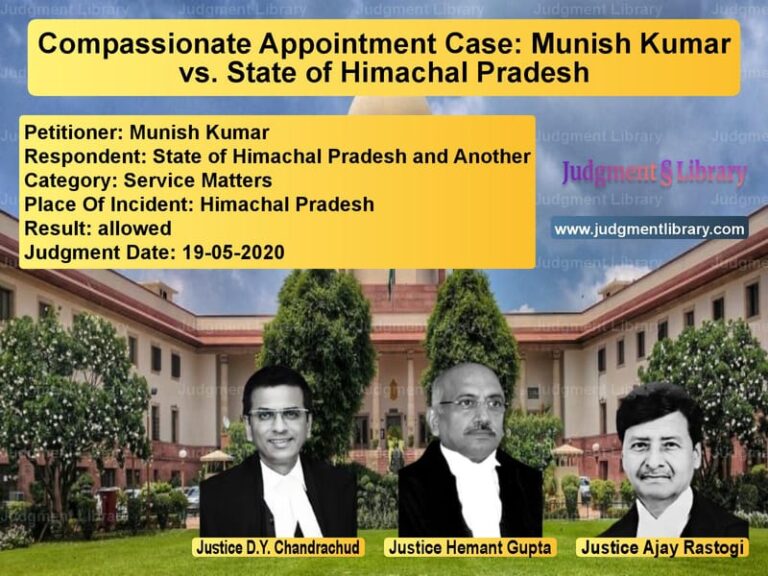Supreme Court Rules on Double Over Time Allowance for Supervisors in Security Printing & Minting Corporation
The Supreme Court of India delivered a significant judgment in the case of Security Printing & Minting Corporation of India Ltd. & Ors. v. Vijay D. Kasbe & Ors. regarding the entitlement of supervisors to Double Over Time Allowance (DOTA) under the Factories Act, 1948. The case, which has a long and complex history, was decided in favor of the appellants, setting aside the High Court’s ruling that had granted overtime allowance to the supervisors.
The dispute revolved around whether employees working as supervisors in government-owned mints, security presses, and note printing facilities were entitled to additional compensation for extended working hours. The Court examined statutory provisions, past rulings, and the nature of employment to arrive at its decision.
Background of the Case
Before 2006, the Ministry of Finance, Government of India, directly managed nine production units, including mints, currency note presses, and security printing presses. In 2006, these units were transferred to the newly formed Security Printing & Minting Corporation of India Ltd. (hereinafter ‘Corporation’), inheriting assets, liabilities, and ongoing legal disputes.
The case originates from a 1988 order issued by the Special Officer (Currency & Coinage), Ministry of Finance, which provided for special allowances in lieu of overtime for non-gazetted supervisory staff. However, a subsequent order in 2000 imposed a salary threshold beyond which employees would not be eligible for such allowances.
Employees working as Supervisors, Works Engineers, and Section Officers in the Nashik Currency Note Press challenged these changes, leading to prolonged litigation before multiple forums, including the Central Administrative Tribunal (CAT) and the Bombay High Court. The Tribunal initially ruled in favor of the employees, granting them DOTA, a decision which was upheld by the High Court but later challenged before the Supreme Court.
Arguments Before the Supreme Court
Petitioner’s Arguments
The Corporation contended that supervisors were not eligible for DOTA as they:
- Were engaged primarily in supervisory roles rather than manual or clerical work.
- Fell under the exemption provided by Rule 100 of the Maharashtra Factories Rules, 1963, which excludes certain supervisory positions from overtime provisions.
- Were governed by service rules applicable to government servants rather than industrial workers.
- Had already received alternative allowances as per the 1988 and 2000 orders.
Respondent’s Arguments
The employees argued that:
- They were engaged in substantial clerical and manual work as part of their regular duties.
- The Factories Act, 1948, applied to their employment, making them eligible for DOTA.
- The Tribunal had earlier ruled in favor of similarly placed employees, and denying relief to them would be discriminatory.
- Rule 100 of the Maharashtra Factories Rules, 1963, did not apply to them as they performed manual labor.
Supreme Court’s Observations
Applicability of the Factories Act, 1948
The Supreme Court first analyzed whether the Security Printing & Minting Corporation’s units qualified as ‘factories’ under the Factories Act, 1948 and whether the employees were ‘workers’ under the same statute.
Read also: https://judgmentlibrary.com/annual-increment-on-retirement-supreme-court-upholds-employee-rights/
The Court agreed that the Corporation’s facilities were factories. However, it ruled that not all employees were ‘workers’ under Section 2(l) of the Act. Supervisors primarily engaged in overseeing work rather than directly performing manual tasks did not qualify as workers.
Exemption Under Maharashtra Factories Rules
The Court examined Rule 100 of the Maharashtra Factories Rules, 1963, which exempts supervisors from overtime benefits unless they perform clerical or manual labor as a regular part of their duties. The Court found:
- The employees in question were responsible for managing operations and exercising authority over workers.
- Routine oversight of machinery or workforce does not amount to clerical/manual work.
- The Tribunal’s conclusion that these supervisors performed significant manual work was inconsistent with service records.
Government Service Rules vs. Industrial Employment
The Court emphasized the difference between industrial workers and government employees. Supervisors were part of a structured government service and subject to regulations applicable to public servants, rather than industrial workers governed by labor laws.
Contradictory Tribunal Rulings
The Supreme Court pointed out inconsistencies in past Tribunal decisions. Earlier, the Tribunal had denied claims for DOTA to a different group of supervisors. The conflicting rulings on identical issues created an anomaly that the Supreme Court sought to correct.
Final Judgment
The Supreme Court ruled in favor of the Corporation and set aside the High Court’s order. The key rulings were:
- Supervisors are not eligible for DOTA under Section 59(1) of the Factories Act, 1948.
- Rule 100 of Maharashtra Factories Rules applies, exempting them from overtime provisions.
- Government service rules prevail over industrial labor laws in this case.
- No recoveries should be made from employees who had already received payments under previous rulings.
Key Takeaways from the Judgment
- Supervisory employees in government-controlled factories are governed by service rules rather than industrial laws.
- The Factories Act, 1948, does not automatically grant DOTA to all factory employees.
- Regulatory exemptions, such as those in the Maharashtra Factories Rules, are legally valid.
- Inconsistent Tribunal rulings on similar matters can create legal uncertainty, warranting Supreme Court intervention.
Impact of the Judgment
The ruling has significant implications for similar disputes in government-controlled industries:
- For Employees: Those in supervisory roles must understand that their employment is regulated by service rules rather than labor laws.
- For Employers: Government-run factories and similar institutions can rely on service rules to determine entitlements.
- For Tribunals and Courts: The judgment highlights the importance of consistency in adjudicating employment-related disputes.
This judgment reinforces the principle that employment conditions must be assessed based on statutory frameworks rather than assumptions about workplace roles.
Petitioner Name: Security Printing & Minting Corporation of India Ltd. & Ors..Respondent Name: Vijay D. Kasbe & Ors..Judgment By: Justice V. Ramasubramanian, Justice Pankaj Mithal.Place Of Incident: Maharashtra.Judgment Date: 18-04-2023.
Don’t miss out on the full details! Download the complete judgment in PDF format below and gain valuable insights instantly!
Download Judgment: security-printing-&-vs-vijay-d.-kasbe-&-ors-supreme-court-of-india-judgment-dated-18-04-2023.pdf
Directly Download Judgment: Directly download this Judgment
See all petitions in Employment Disputes
See all petitions in Pension and Gratuity
See all petitions in Public Sector Employees
See all petitions in Contractual Employment
See all petitions in Recruitment Policies
See all petitions in Judgment by V. Ramasubramanian
See all petitions in Judgment by Pankaj Mithal
See all petitions in allowed
See all petitions in Quashed
See all petitions in supreme court of India judgments April 2023
See all petitions in 2023 judgments
See all posts in Service Matters Category
See all allowed petitions in Service Matters Category
See all Dismissed petitions in Service Matters Category
See all partially allowed petitions in Service Matters Category







